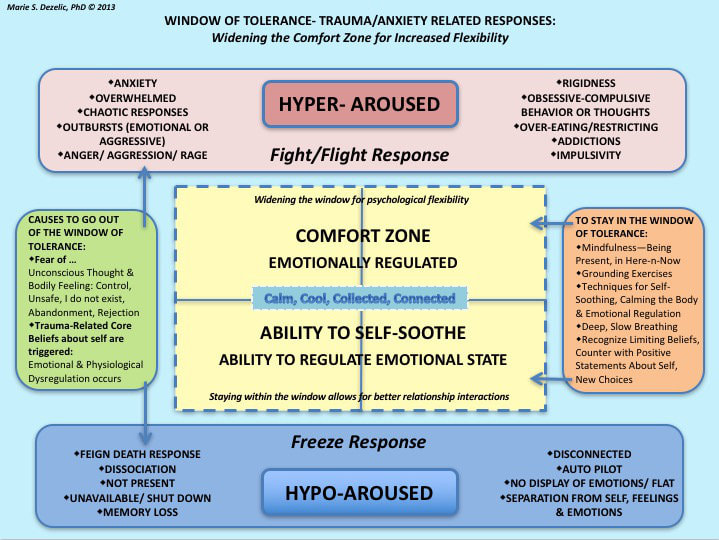Window of Tolerance – Trauma/Anxiety Related Responses: Widening the Comfort Zone for Increased Flexibility by M. Dezelic, PhD © 2013
“Window of Tolerance” is a term coined by Dr. Dan Siegel, and is now widely used in understanding normal brain reaction responses, as well as helping in trauma-informed treatment. The aim is to assist you to learn how to widen your personal, unique Window of Tolerance, as well as to have methods to stay in the Window of Tolerance via self-soothing and self-regulating behaviors.
When you “jump” out, or feel “pushed” out of your Window of Tolerance on the upper or lower sides, the prefrontal cortex (thinking, rational part of your brain) essentially goes offline. Only sub-cortical brain regions (limbic system-emotional brain, and brain stem) stay active, so you have no ability to think through actions and consequences. Before any type of talking or making sense of a situation can occur, you need to find a way back into your Window of Tolerance, through self-soothing and self-regulating behaviors. This will allow all parts of your brain to get back online,so your information processing system can function appropriately. Having this handout can assist you to see what’s happening to you, and why disconnection in relationships occurs when you’re not in your Window of Tolerance.
In relationships, when couples are experiencing extreme distress, both of you are out of your personal Windows of Tolerance. So you each attempt to get your own needs met and can’t take in your partner’s perspective. Each of you needs to learn how to stay in your personal Window of Tolerance, and if possible, to help your partner to stay in their Window if they’re getting out of it. This helps create a matching of Windows, where connection can occur safely and comfortably.
References
Ogden, P., Minton, K., & Pain, C. (2006). Trauma and the body: A sensorimotor approach to psychotherapy. New York: W. W. Norton & Company, Inc.
Porges, S. W. (2011). The polyvagal theory: Neurophysiological foundations of emotions, attachment, communication, and self-regulation. New York: W. W. Norton & Company, Inc.
Siegel, D. J. (2011). Mindsight: The new science of personal transformation. New York: Bantam Books Trade Paperbacks.
Siegel, D. J. (2012). Pocket guide to interpersonal neurobiology: An integrative handbook of the mind. New York: W. W. Norton & Company.

